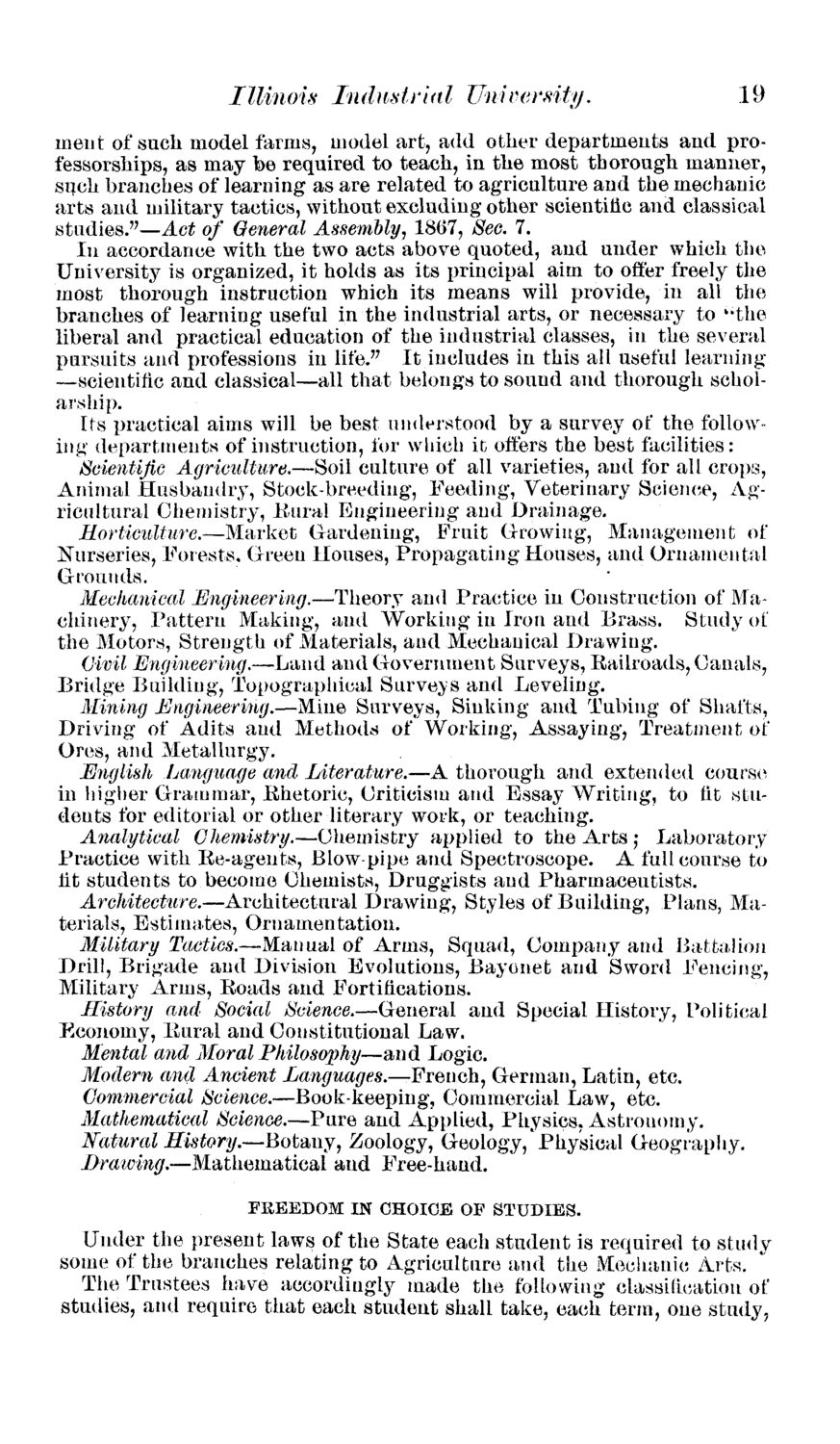| |
| |
Caption: Board of Trustees Minutes - 1874
This is a reduced-resolution page image for fast online browsing.

EXTRACTED TEXT FROM PAGE:
Illinois Industrial University. 19 ment of such model farms, model art, add other departments and professorships, as may be required to teach, in the most thorough manner, such branches of learning as are related to agriculture and the mechanic arts and military tactics, without excluding other scientific and classical studies."—Act of General Assembly, 1867, Sec. 7. In accordance with the two acts above quoted, and under which the University is organized, it holds as its principal aim to offer freely the most thorough instruction which its means will provide, in all the branches of learning useful in the industrial arts, or necessary to "the liberal and practical education of the industrial classes, in the several pursuits and professions in life." It includes in this all useful learning —scientific and classical—all that belongs to sound and thorough scholarship. Its practical aims will be best understood by a survey of the following departments of instruction, for which it offers the best facilities: Scientific Agriculture.—Soil culture of all varieties, and for all crops, Animal Husbandry, Stock-breeding, Feeding, Veterinary Science, Agricultural Chemistry, Rural Engineering and Drainage. Horticulture.—Market Gardening, Fruit Crowing, Management of Nurseries, Forests, Green Houses, Propagating Houses, and Ornamental Grounds. Mechanical Engineering.—Theory and Practice in Construction of Machinery, Pattern Making, and Working in Iron and Brass. Study of the Motors, Strength of Materials, and Mechanical Drawing. Civil Engineering.—Land and Government Surveys, Railroads, Canals, Bridge Building, Topographical Surveys and Leveling. Mining Engineering.—Mine Surveys, Sinking and Tubing of Shafts, Driving of Adits and Methods of Working, Assaying, Treatment of Ores, and Metallurgy. English Language and Literature.—A thorough and extended course in higher Grammar, Rhetoric, Criticism and Essay Writing, to fit students for editorial or other literary work, or teaching. Analytical Chemistry.—Chemistry applied to the A r t s ; Laboratory Practice with Re-agents, Blow pipe and Spectroscope. A full course to fit students to become Chemists, Druggists and Pharmaceutists. Architecture.—Architectural Drawing, Styles of Building, Plans, Materials, Estimates, Ornamentation. Military Tactics.—Manual of Arms, Squad, Company and Battalion Drill, Brigade and Division Evolutions, Bayonet and Sword Fencing, Military Arms, Roads and Fortifications. History and Social Science.—General and Special History, Political Economy, Rural and Constitutional Law. Mental and Moral Philosophy—and Logic. Modern and Ancient Languages.-— French, German, Latin, etc. Commercial Science.—Book-keeping, Commercial Law, etc. Mathematical Science.—Pure and Applied, Physics, Astronomy. Natural History.—Botany, Zoology, Geology/Physical Geography. Drawing,—Mathematical and Free-hand. FREEDOM IN CHOICE OF STUDIES. Under the present laws of the State each student is required to study some of the branches relating to Agriculture and the Mechanic Arts. The Trustees have accordingly made the following classification of studies, and require that each student shall take, each term, one study,
| |